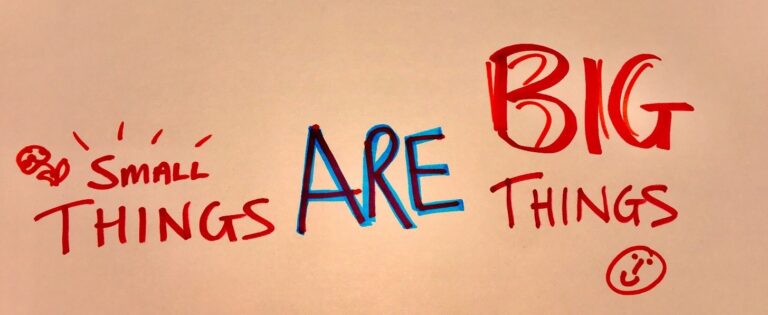As we have talked to people all over the world about their “what matters to you?” conversations we have noticed some interesting themes. One of the most common things people notice is that small things seem to make a really big difference.
Of course, this is not a new phenomenon and we have perhaps often experienced this ourselves or heard it said by others. But why do apparently small, simple things often have such a powerful impact in health and care experiences?
“She smiled as she spoke to me…”
“He always remembered that I like my tea in china mug…”
“They always brought me my tablets after 10am because that’s when I take them at home…”
How is it that such apparently inconsequential things seem to have a disproportionate positive impact on the emotional and physical well-being of people receiving care and support?
When Austrian psychiatrist Viktor Frankl was incarcerated in a concentration camp during the Second World War he experienced and witnessed unimaginable suffering and pain. When he wrote about these events later in life[1] one of his many reflections was that the greater the suffering he was experiencing, the more a simple act of kindness was amplified. Small acts of kindness that would have passed barely noticed in normal life suddenly had enormous impact, generating a surge of feelings of hope and being valued as a human being. A morsel of mouldy bread flicked his way by a guard, a scrap of lice-infested blanket shared by a fellow prisoner, suddenly became endowed with transformative power!
Frankl’s hypothesis is that the greater the suffering of an individual, the greater the impact of an act of simple kindness, no matter how small it may seem to the benefactor. This perhaps goes some way towards explaining why entering into a conversation with a person and understanding what really matters to them, and then doing something about it, can be such a powerful intervention. The people we come into contact with each day are often dealing with great challenges in their lives, challenges which often come with intense physical or emotional suffering and pain. A conversation focused on the things that are really important to a person in such circumstances, no matter how small and trivial these things might seem to us, has the power to generate hope, a feeling of being a person of value and the power to transform. Even if sometimes we are at a loss to know what to do we shouldn’t forget the power of listening as an act of kindness in its own right – to know you have been heard and feel that someone really cares isn’t nothing! Small things matter.

~ Shaun Maher, Strategic Advisor for Person Centred Care and Improvement, Scottish Government
[1] Frankl, V. Man’s search for meaning. Beacon Press (1966) Originally published 1946